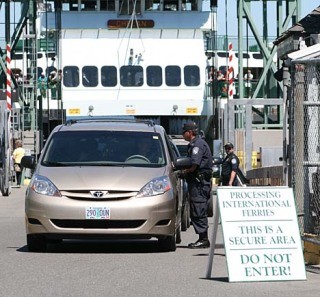Procrastinators, beware: You’ve already missed the deadline.
On Monday, new federal rules went into effect that require anyone crossing the international border into Canada or Mexico to have either a passport, a passport card or, if you’re a Washington resident, a state-issued enhanced driver’s license or a similarly enhanced I.D. card.
This time around, there are no exceptions, at least for adults. Unless, that is, you’re already a NEXUS card-holder. The NEXUS program, tailor-made for those who frequently cross the border, whether on business or otherwise, requires a background check, a face-to-face interview and approval of U.S. and Canadian border officials.
Some travelers, accustomed to crossing into Canada with a driver’s license and other form of I.D., may be caught off-guard. But Director Barry Clement of the U.S. Customs and Border Patrol in Friday Harbor believes most islanders, as well as those from abroad who regularly visit the San Juans, are well-versed about which documents will be accepted, and are already prepared.
Last year, Customs officers assigned to the Port of Friday Harbor inspected 9,752 vessels and 572 private aircraft.
“I don’t expect any real bumps in the road,” Clement said. “Very few people show up here without secure documents, and out here in the islands, just about everyone has a passport.”
Based on recommendation of the 9/11 Commission, the U.S. Department of Homeland Security tightened down on the type of documents accepted at international border crossing following congressional approval of the Intelligence Reform and Terrorism Prevention Act in 2004.
Implemented as part of the Western Hemisphere Travel Initiative, the new restrictions have been introduced in two phases, beginning two years ago with air travel and passengers on international flights. Phase Two, affecting travel by land or sea, took effect on Monday.
The new restrictions also apply on travel to and from Bermuda and 17 Caribbean nations.
At $100 a pop for adults and $85 for children, the cost of a standard passport, for some, can be pricey. There are less costly alternatives, however, though they may be less effective in scope. A passport card, at $45 for adults and $35 for children 15 or younger, is less than half the price of a standard passport.
According to San Juan County Court Clerk Joan White, the passport card has proven popular with families with young children that travel to and from Canada with some regularity. British Columbia’s Big White ski resort, Victoria and the city of Vancouver are frequent destinations for many islanders.
In recent years, staff at San Juan County Superior Court have witnessed a surge in the number of people applying for passports. But demand at the court, which processes applications that are then forwarded to the U.S. Department of State for approval, has tapered off. Roughly 75 applications are processed a month, White said.
“They’re not beating down our door or waiting in long lines outside our office,” she said.
That may be because Washington residents are opting for the state’s Enhanced Drivers License or Enhanced I.D. card. Both are federally-approved for travel to and from Canada, Mexico and the Caribbean, by land or sea. The cost is $15 more than a standard license or I.D. card, but can only be obtained by applying in person.




